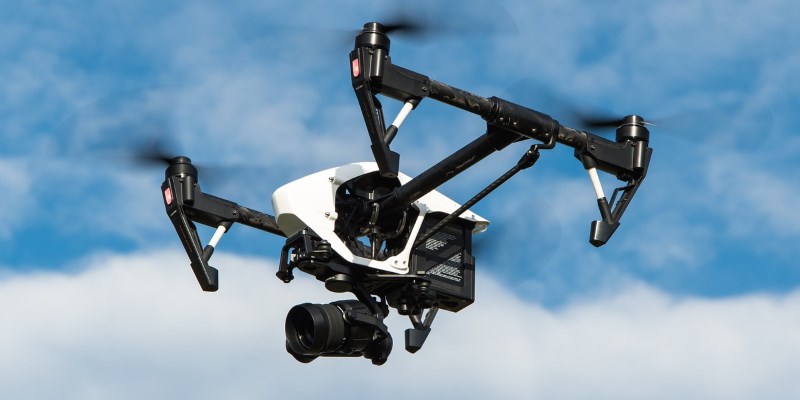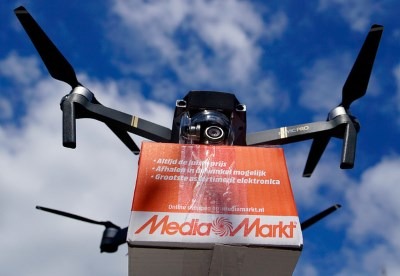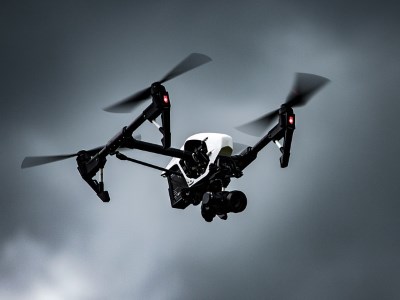
With every new technological development, there’s the opportunity for it to be used for nefarious purposes. With drones now fully available to the public, everyone has access to a small flying device. This may seem innocent at first, but a drone’s damage potential is surprisingly high. Gatwick airport in England was shut down over the very busy Christmas holiday period in 2018 due to people flying drones over its airspace. You only need to see the test done to replicate a drone collision with a plane mid-flight to understand why.

At the moment, the only people flying drones around airports are well-meaning people simply wanting to catch the sights from a bird’s eye perspective. As this technology becomes more advanced, however, we may see people deliberately using drones as tools for terrorism.
How Drones Can Support Terrorism
Drones allow terrorists to perform attacks that were previously impossible. Their airborne abilities means terrorists essentially have access to small helicopters that can do their bidding. This opens up a new dimension of attack which needs to be defended against as drones become more mainstream and advanced.
Weaponised Attacks
Weaponized drone terrorism may sound like something out of a sci-fi film, but it’s already a reality. We’ve already seen an incident in 2018 where Venezuelan President Nicolás Maduro was attacked by two explosive-laden drones as he was presenting a speech on the military. The explosives detonated before they reached their target, but it’s still a sign that weaponized drone attacks are very real.
Smuggling

We’re all keen over the idea of delivery drones replacing our mailmen. How exciting must it be to get your new Amazon purchase via a flying robot? Unfortunately, the carrier capacity of drones also makes it a key element in smuggling items.
Again, this sounds like something you’d only see in the cinema, but it’s very much real! In 2018, we saw a UK gang arrested for smuggling drugs into prison by using drones. Current methods of security don’t really take into consideration the prospect of a small flying smuggling vehicle, so hotspots for smuggling must develop their defense plans to take into account these new airborne threats.
Hacking
Drones can also be used in hacking operations. They’ve been described as “laptops that can fly,” which makes them capable of hijacking Wi-Fi and Bluetooth connections from previously impossible-to-reach locations. A router high up in a company skyscraper and protected by keycard doors may have lax security installed on it, as no outsider can gain access to it from the inside. From the outside, however, a drone can land on the roof and connect to it via Wi-Fi. Once it’s connected, a terrorist can hack into the router without needing to enter the premises whatsoever.
Should We Restrict Drone Sales?

While drones are a very scary prospect, there’s no reason to lock them away from the public entirely. We see similar tools of potential destruction freely sold to the public without too much problem, such as fireworks. It’s when someone has access to potentially dangerous levels of equipment that precautions need to be made, much like how a professional fireworks display operator requires a background check.
We’re already seeing progress on this front: the FAA has made a new rule that anyone piloting drones in a commercial capacity has to have a background check done beforehand. I feel this is very justified, and a good sign of things moving forward. With great power comes great responsibility, and giving people commercial-quality drones must be met with checks and tests.
However, when it comes to giving Jimmy a small store-bought drone for his 12th birthday present, I don’t think he needs to have checks done on him to ensure he won’t use it for illegal means. This would be better tackled by creating new, tighter laws around the usage of drones, like disallowing them to fly over airfields or near public buildings without permission.
Droning On
With the invention of drones comes the prospect of drone terrorism. Drones can attack the public in a variety of ways, some of which have even come to light. While drones should not be restricted on the same level as guns, I believe commercial-level drones should have background checks and strict laws made to prevent store-bought models from doing damage.
Do you think we’re too lax with our current drone laws? Are they too strict? Or should we keep them as they are? Let us know below.
Image Credit: Drone Delivery
Get the best of IoT Tech Trends delivered right to your inbox!









